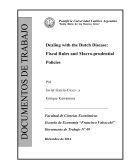Por favor, use este identificador para citar o enlazar este ítem:
https://repositorio.uca.edu.ar/handle/123456789/2229| Título: | Dealing with the dutch disease : fiscal rules and macro-prudential policies | Autor: | García Cicco, Javier Kawamura, Enrique |
Otros colaboradores: | Universidad Católica Argentina. Facultad de Ciencias Económicas. Escuela de Economía "Francisco Valsecchi" | Palabras clave: | POLITICA FISCAL; MACROECONOMIA; POLITICA ECONOMICA; GASTO PUBLICO | Fecha de publicación: | 2014 | Editorial: | Universidad Católica Argentina. Facultad de Ciencias Económicas. Escuela de Economía "Francisco Valsecchi" | Cita: | García Cicco, J., Kawamura, E. (2014, diciembre). Dealing with the dutch disease : fiscal rules and macro-prudential Documento de trabajo No. 49 de la Escuela de Economía “Francisco Valsecchi”. Facultad de Ciencias Económicas. Universidad Católica Argentina. Disponible en: https://repositorio.uca.edu.ar/handle/123456789/2229 | Resumen: | Abstract: We evaluate from a welfare perspective three policy alternatives frequently proposed to deal with Dutch-disease problems originated from cyclical movements in commodity prices. Namely, fiscal rules for government expenditures, capital controls, and taxes to domestic lending. To this end, we develop a DSGE model of a small open economy with a sectoral decomposition that features three distinctive characteristics: financial frictions, a learning-by-doing externality in the industrial sector, and a fraction of households being non-Ricardian (credit constrained). The first two features induce inefficient relocations after commodity shocks, while the later is relevant to study the role of fiscal rules. We calibrate the model using Chilean data, applying an impulse-response-matching approach. For each of the policy tools, we analyze optimal simple rules from a welfare (Ramsey) perspective, describing how different households rank the several policy alternatives, and studying how each of the models features shape the optimal policy design. A general conclusion of the analysis is that the included Dutch-disease inefficiencies are of limited quantitatively relevance in analyzing the desirability of these policies from a welfare perspective | URI: | https://repositorio.uca.edu.ar/handle/123456789/2229 | Disciplina: | ECONOMIA | Derechos: | Acceso Abierto | Fuente: | Documento de Trabajo nº 49, 2014 |
| Aparece en las colecciones: | DTE 2014 |
Ficheros en este ítem:
| Fichero | Descripción | Tamaño | Formato | |
|---|---|---|---|---|
| dealing-dutch-disease-fiscal.pdf | 495,72 kB | Adobe PDF |  Visualizar/Abrir |
Visualizaciones de página(s)
159
comprobado en 27-abr-2024
Descarga(s)
248
comprobado en 27-abr-2024
Google ScholarTM
Ver en Google Scholar
Este ítem está sujeto a una Licencia Creative Commons

